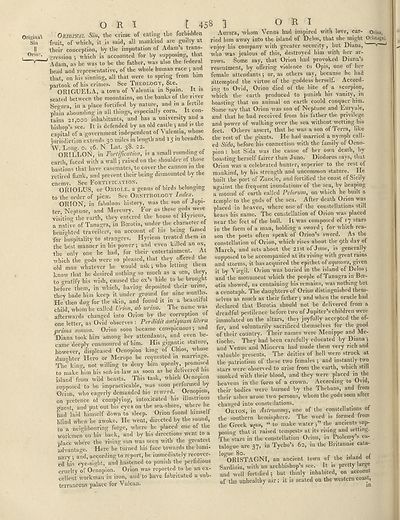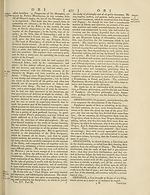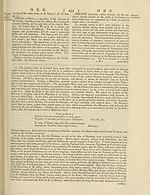Encyclopaedia Britannica > Volume 15, NIC-PAR
(512) Page 458
Download files
Complete book:
Individual page:
Thumbnail gallery: Grid view | List view

O R I
[ 458 ]
OKI
OriginaV
Sin
II
Orior.
Original Sin, the crime of eating the forbidden
fruit, of which, it is said, all mankind are guilty at
their conception, by the imputation ot Adam s trans-
. gression which is accounted for by supposing, that
Adam, as he was to be the father, was also the federal
head and representative, of the whole human race •, and
that, on his sinning, all that were to spring from him
partook of his crimes. See Theology, &c.
ORIGUELA, a town of Valentia in Spain, it is
seated between the mountains, on the banks of the river
Segura, in a place fortified by nature, and in a fertile
plain abounding in all things, especially corn. It con¬
tains 21,000 inhabitants, and has a university and a
bishop’s see. It is defended by an old castle 5 and is the
capital of a government independent of ’S alentia, whose
jurisdiction extends 30 miles in length and 15 in breadth.
W. Long. o. 56. N Lat. 38. 22.
ORILLON, in Fortification, is a small rounding ot
earth, faced with a wall j raised on the shoulder of those
bastions that have casemates, to cover the cannon in the
retired flank, and prevent their being dismounted by the
enemy. See Fortification.
ORIOLUS, or Oriole, a genus of birds belonging
to the order of picm. See Ornithology Index.
ORION, in fabulous history, was the son of Jupi¬
ter, Neptune, and Mercury. For as these gods were
visiting the earth, they entered the house of Hyneus
a native of Tanagra, in Roeotia, under the character of
benighted travellers, on account of his being famed
for hospitality to strangers. Hyneus treated them in
the best manner in his power •, and even killed an ox,
the only one he had, for their entertainment. At
•which the gods ivere so pleased, that they offered the
old man whatever he would ask ; who letting them
know that he desired nothing so much as a son, they,
to gratify his wish, caused the ox’s hide to be brought
before them, in which, having deposited their urine,
they bade him keep it under ground for nine months.
He then dug for the skin, and found it in a beautiful
child, whom he called Urion, ab arina. The name was
afterwards changed into Orion bv the corruption ot
one letter, as Ovid observes : Perdidit antiquum htera
‘prima sonum. Orion soon became conspicuous; and
.Diana took him among her attendants, and even be¬
came deeply enamoured of him. His gigantic stature,
however, displeased Oenopion king of Chios, whose
daughter Hero or Merope he requested in marriage.
The king, not willing to deny him openly, promised
to make him his soh-in law as soon as he delivered his
island from wild beasts. This task, which Oenopion
supposed to be impracticable, was soon performed by
Orion, who eagerly demanded his reward. Oenopion,
on pretence of complying, intoxicated his illustrious
guest, and put out his eyes on the sea-shore, where he
had laid himself down to sleep. Orion found himself
blind when he awoke. He went, directed by the sound,
to a neighbouring forge, where he placed one of the
Workmen on his back, and by his directions went to a
place where the rising sun rvas seen with the greatest
advantage. Here he turned bis face towards the lumi¬
nary ; and, according to report, he immediately recover¬
ed his eye-sight, and hastened to punish the perfidious
cruelty of Ocnopion. Orion was reported to be an ex¬
cellent workman in iron, and to have fabricated a sub¬
terraneous palace for Vulcan.
Aurora, whom Venus had inspired witn love, car- Oiion,
ried him away into the island of Delos, that she might Oristagni,
enjoy his company with greater security, but Diana,' 'r'w
who was jealous of this, destroyed him with her ar¬
rows. Some say, that Orion had provoked Diana’s
resentment, by offering violence to Opis, one of her
female attendants; or, as others say, because he had
attempted the virtue of the goddess herself. Accord¬
ing to Ovid, Orion died of the bite of a scorpion,
which the earth produced to punish his vanity, in
boasting that no animal on earth could conquer him.
Some say that Orion was son of Neptune and Euryale,
and that he had received from his father the privilege
and power of walking over the sea without wetting his
feet. Others assert, that he was a son of Terra, like
the rest of the giants. He had married a nymph call¬
ed Sida, before his connection -with the family of Oeno-
pion : but Sida was the cause of her own death, by
boasting herself fairer than Juno. Diodorus says, that
Orion was a celebrated hunter, superior to the rest ot
mankind, by his strength and uncommon stature. He
built the port of Zancle, and fortified the coast of Sicily
against the frequent inundations of the sea, by heaping
a mound of earth called Pelorum, on which he built a
temple to the gods of the sea. After death Orion was
placed in heaven, where one of the constellations still
bears his name. The constellation of Orion was placed
near the feet of the bull. It was composed of 17 stars
in the form of a man, holding a sword ; for which rea¬
son the poets often speak of Orion’s sword. As the
constellation of Orion, which rises about the 9th day ot
March, and sets about the 21st of June, is generally
supposed to be accompanied at its rising with great rains
and storms, it has acquired the epithet of aquosus, given
it by Virgil. Orion was buried in the island of Delos;
and the monument which the people of Janagra in Boe-
otia showed, as containing his remains, was nothing but
a cenotaph. The daughters of Orion distinguished them¬
selves as much as their father ; and when the oracle had
declared that Bceotia should not be delivered from a
dreadful pestilence before two of Jupiter’s children were
immolated on the altars, they joyfully accepted the of¬
fer, and voluntarily sacrificed themselves for the good
of their country. Their names were Menippe and Me-
tioche. They had been carefully educated by Diana ;
and Venus and Minerva had made them very rich and
valuable presents. The deities of hell were struck at
the patriotism of these two females ; and instantly tvyo
stars were observed to arise from the earth, which still
smoked with their blood, and they were placed in the
heavens in the form of a crown. According to Ovid,
their bodies were burned by the Thebans, and from
their ashes arose two persons, whom the gods soon after
changed into constellations.
Orion, in Astronomy, one of the constellations ot
the southern hemisphere. The word is formed from
the Greek “ to make water the ancients sup¬
posing that it raised tempests at its rising and setting.
The stars in the constellation Orion, in Ptolemy’s ca¬
talogue are 37, in Tycho’s 62, in the Britannie cata¬
logue 80. • 1 j r
ORISTAGNI, an ancient town of the island ot
Sardinia, with an archbishop’s see. It is pretty large
and well fortified; but thinly inhabited, on account
of the unhealthy air; it is seated on the western coast,
[ 458 ]
OKI
OriginaV
Sin
II
Orior.
Original Sin, the crime of eating the forbidden
fruit, of which, it is said, all mankind are guilty at
their conception, by the imputation ot Adam s trans-
. gression which is accounted for by supposing, that
Adam, as he was to be the father, was also the federal
head and representative, of the whole human race •, and
that, on his sinning, all that were to spring from him
partook of his crimes. See Theology, &c.
ORIGUELA, a town of Valentia in Spain, it is
seated between the mountains, on the banks of the river
Segura, in a place fortified by nature, and in a fertile
plain abounding in all things, especially corn. It con¬
tains 21,000 inhabitants, and has a university and a
bishop’s see. It is defended by an old castle 5 and is the
capital of a government independent of ’S alentia, whose
jurisdiction extends 30 miles in length and 15 in breadth.
W. Long. o. 56. N Lat. 38. 22.
ORILLON, in Fortification, is a small rounding ot
earth, faced with a wall j raised on the shoulder of those
bastions that have casemates, to cover the cannon in the
retired flank, and prevent their being dismounted by the
enemy. See Fortification.
ORIOLUS, or Oriole, a genus of birds belonging
to the order of picm. See Ornithology Index.
ORION, in fabulous history, was the son of Jupi¬
ter, Neptune, and Mercury. For as these gods were
visiting the earth, they entered the house of Hyneus
a native of Tanagra, in Roeotia, under the character of
benighted travellers, on account of his being famed
for hospitality to strangers. Hyneus treated them in
the best manner in his power •, and even killed an ox,
the only one he had, for their entertainment. At
•which the gods ivere so pleased, that they offered the
old man whatever he would ask ; who letting them
know that he desired nothing so much as a son, they,
to gratify his wish, caused the ox’s hide to be brought
before them, in which, having deposited their urine,
they bade him keep it under ground for nine months.
He then dug for the skin, and found it in a beautiful
child, whom he called Urion, ab arina. The name was
afterwards changed into Orion bv the corruption ot
one letter, as Ovid observes : Perdidit antiquum htera
‘prima sonum. Orion soon became conspicuous; and
.Diana took him among her attendants, and even be¬
came deeply enamoured of him. His gigantic stature,
however, displeased Oenopion king of Chios, whose
daughter Hero or Merope he requested in marriage.
The king, not willing to deny him openly, promised
to make him his soh-in law as soon as he delivered his
island from wild beasts. This task, which Oenopion
supposed to be impracticable, was soon performed by
Orion, who eagerly demanded his reward. Oenopion,
on pretence of complying, intoxicated his illustrious
guest, and put out his eyes on the sea-shore, where he
had laid himself down to sleep. Orion found himself
blind when he awoke. He went, directed by the sound,
to a neighbouring forge, where he placed one of the
Workmen on his back, and by his directions went to a
place where the rising sun rvas seen with the greatest
advantage. Here he turned bis face towards the lumi¬
nary ; and, according to report, he immediately recover¬
ed his eye-sight, and hastened to punish the perfidious
cruelty of Ocnopion. Orion was reported to be an ex¬
cellent workman in iron, and to have fabricated a sub¬
terraneous palace for Vulcan.
Aurora, whom Venus had inspired witn love, car- Oiion,
ried him away into the island of Delos, that she might Oristagni,
enjoy his company with greater security, but Diana,' 'r'w
who was jealous of this, destroyed him with her ar¬
rows. Some say, that Orion had provoked Diana’s
resentment, by offering violence to Opis, one of her
female attendants; or, as others say, because he had
attempted the virtue of the goddess herself. Accord¬
ing to Ovid, Orion died of the bite of a scorpion,
which the earth produced to punish his vanity, in
boasting that no animal on earth could conquer him.
Some say that Orion was son of Neptune and Euryale,
and that he had received from his father the privilege
and power of walking over the sea without wetting his
feet. Others assert, that he was a son of Terra, like
the rest of the giants. He had married a nymph call¬
ed Sida, before his connection -with the family of Oeno-
pion : but Sida was the cause of her own death, by
boasting herself fairer than Juno. Diodorus says, that
Orion was a celebrated hunter, superior to the rest ot
mankind, by his strength and uncommon stature. He
built the port of Zancle, and fortified the coast of Sicily
against the frequent inundations of the sea, by heaping
a mound of earth called Pelorum, on which he built a
temple to the gods of the sea. After death Orion was
placed in heaven, where one of the constellations still
bears his name. The constellation of Orion was placed
near the feet of the bull. It was composed of 17 stars
in the form of a man, holding a sword ; for which rea¬
son the poets often speak of Orion’s sword. As the
constellation of Orion, which rises about the 9th day ot
March, and sets about the 21st of June, is generally
supposed to be accompanied at its rising with great rains
and storms, it has acquired the epithet of aquosus, given
it by Virgil. Orion was buried in the island of Delos;
and the monument which the people of Janagra in Boe-
otia showed, as containing his remains, was nothing but
a cenotaph. The daughters of Orion distinguished them¬
selves as much as their father ; and when the oracle had
declared that Bceotia should not be delivered from a
dreadful pestilence before two of Jupiter’s children were
immolated on the altars, they joyfully accepted the of¬
fer, and voluntarily sacrificed themselves for the good
of their country. Their names were Menippe and Me-
tioche. They had been carefully educated by Diana ;
and Venus and Minerva had made them very rich and
valuable presents. The deities of hell were struck at
the patriotism of these two females ; and instantly tvyo
stars were observed to arise from the earth, which still
smoked with their blood, and they were placed in the
heavens in the form of a crown. According to Ovid,
their bodies were burned by the Thebans, and from
their ashes arose two persons, whom the gods soon after
changed into constellations.
Orion, in Astronomy, one of the constellations ot
the southern hemisphere. The word is formed from
the Greek “ to make water the ancients sup¬
posing that it raised tempests at its rising and setting.
The stars in the constellation Orion, in Ptolemy’s ca¬
talogue are 37, in Tycho’s 62, in the Britannie cata¬
logue 80. • 1 j r
ORISTAGNI, an ancient town of the island ot
Sardinia, with an archbishop’s see. It is pretty large
and well fortified; but thinly inhabited, on account
of the unhealthy air; it is seated on the western coast,
Set display mode to:
![]() Universal Viewer |
Universal Viewer | ![]() Mirador |
Large image | Transcription
Mirador |
Large image | Transcription
Images and transcriptions on this page, including medium image downloads, may be used under the Creative Commons Attribution 4.0 International Licence unless otherwise stated. ![]()
| Encyclopaedia Britannica > Encyclopaedia Britannica > Volume 15, NIC-PAR > (512) Page 458 |
|---|
| Permanent URL | https://digital.nls.uk/192588354 |
|---|
| Attribution and copyright: |
|
|---|
| Shelfmark | EB.11 |
|---|---|
| Description | Ten editions of 'Encyclopaedia Britannica', issued from 1768-1903, in 231 volumes. Originally issued in 100 weekly parts (3 volumes) between 1768 and 1771 by publishers: Colin Macfarquhar and Andrew Bell (Edinburgh); editor: William Smellie: engraver: Andrew Bell. Expanded editions in the 19th century featured more volumes and contributions from leading experts in their fields. Managed and published in Edinburgh up to the 9th edition (25 volumes, from 1875-1889); the 10th edition (1902-1903) re-issued the 9th edition, with 11 supplementary volumes. |
|---|---|
| Additional NLS resources: |
|

